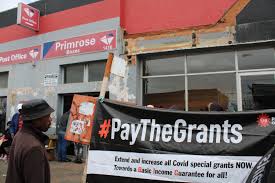By Thapelo Molefe
Civil society organisations have called on the government to honour the high court in Pretoria’s groundbreaking judgment on the Social Relief of Distress (SRD) grant, urging it not to appeal the ruling.
The judgment, delivered on Thursday, is a significant victory for South Africa’s most vulnerable citizens. It confirms that up to 18.3 million people are eligible for the grant and orders the government to dismantle barriers that have long prevented millions from accessing vital support.
The Institute for Economic Justice (IEJ) and the #PayTheGrants campaign emphasised that the judgment aligned with constitutional obligations and offered a unique opportunity to transform the lives of millions of South Africans.
“This decision paves the way for a more just social protection system,” the organisations told reporters on Friday.
“We appeal to the government to implement these reforms urgently and in the spirit of ensuring dignity for all.”
Barriers include the exclusive use of online applications, flawed bank verification processes and reliance on inaccurate databases, all of which the court deemed unconstitutional.
The court also rejected the government’s claim that the SRD grant was a temporary measure, ruling that it must be treated as a permanent entitlement under the Social Assistance Act.
It ordered the government to improve the value of the grant, currently set at R370, and align it with official poverty lines to better address the rising cost of living.
The judgment also criticised the government’s approach to social assistance. The organisations said the National Treasury, in particular, was singled out for imposing unconstitutional budget restrictions and interfering in social development policies.
The court found that Treasury’s actions prioritised cost-cutting over the constitutional rights of vulnerable citizens.
“It is unthinkable for the government to acknowledge that more than 18.3 million people need support, but only budget for 10.5 million,” the judgment stated.
The organisations echoed this criticism, highlighting the systemic neglect of South Africa’s poor.
“The judge agrees with us there and on a number of instances that these regulations are intended to exclude,” said IEJ executive director Gilad Issacs.
“What this highlights is the inequities within government and the undue and unwarranted power being influenced by those in a government who hold purse strings.
“That undue influence is once again being exercised right now, with the Treasury once again allegedly attempting to not renew the SRD in the upcoming Budget.”
The Socio-Economic Rights Institute (SERI) has described the ruling as a lifeline for millions of South Africans.
It argued that the government now had a clear mandate to expand and improve the SRD grant system, transitioning toward a more comprehensive social safety net.
The ruling orders the government to take immediate steps to rectify systemic flaws in the SRD grant programme.
“It cannot make sense to say the poorest of the poor, who are unlikely to have no means, must go and apply online. It really must be arbitrary to have taken that step,” said SERI’s Nomzamo Zondo.
Earlier this week, the South African Social Security Agency (Sassa) suspended grant payments to all accounts it suspected to be fraudulent to allow a process where beneficiaries would have to verify their details.
Within four months, the Department of Social Development and Sassa must devise and implement a plan to address issues such as delayed payments, inadequate eligibility criteria and the retrogression in the grant’s value.
The organisations emphasised that cooperation between the government and civil society was essential for these reforms to succeed.
“This judgment is not just a victory for civil society, it is a victory for millions of people who rely on this grant for survival. We urge the government to embrace this opportunity to deliver meaningful change,” they said.
With over half of South Africa’s population directly or indirectly impacted by the SRD grant, the judgment marks a critical step toward addressing the country’s poverty and inequality.
INSIDE POLITICS

